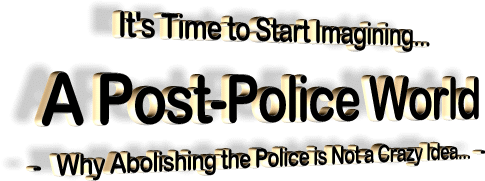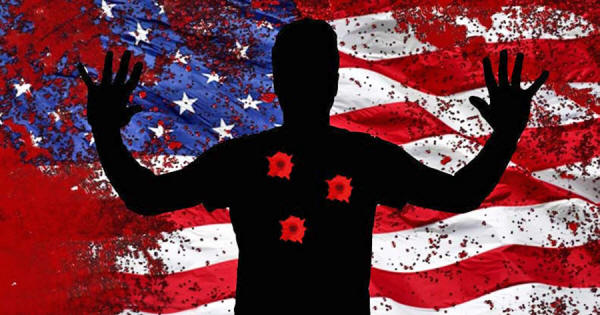|
might be our only hope to reform police brutality, violence, and skyrocketing incarceration rate.
Although this existential question often produces a knee-jerk,
...a growing call for the abolition of police - and working examples to back it up - deserves more than scornful dismissal, particularly amid epidemic-level violence by agents of the state.
Police are under no obligation to protect the public they putatively serve - a series of state and Supreme Court decisions stretching back more than three decades indisputably establish this fact - so the lingering question,
...is of no consequence to the case for dismantling every police department in the nation.
On the contrary, police,
...the citizenry with alarming frequency - and rarely face consequences beyond a paid vacation farcically termed 'administrative leave' for doing so.
Rather than fight and solve violent crimes, police act as little more than heavily militarized code-enforcers, or as David Graeber of the London School of Economics aptly terms, "bureaucrats with weapons" - protecting us from broken tail lights, missing front license plates, and imperfect lane changes more often than from robbery, homicide, and rape.
Give police the equipment and weapons of war under the premise of fighting terrorism, when terrorism is all but nonexistent, and predictably, they will go to war.
As Abraham Maslow posited in 1966 in a concept known as the law of the instrument,
We, the citizenry, are not nails to be forcibly and violently coerced into submission over the tiniest of nonviolent and inconsequential infractions - but, whether or not we're inclined to admit as much, that summarizes our current situation in the eyes of an overbearing state and its criminalization of, in essence, daily life.
How this police state cinched a noose-like grip on the nation, at this late date, arguably matters little in deference to the urgency it must be addressed.
And while solutions run the gamut from individual officer liability insurance to the use of body cameras, forcing an on-call policy akin to that of fire departments to an overhaul of training policies, as it becomes apparent nothing will be done, the larger aforementioned existential question must come into play.
Are police a necessary element in an ordered, peaceful society?
In short, the answer is no - absolutely not - largely because police spend such little time policing anything other than ridiculous laws created solely for the purpose of revenue generation to justify their own existence.
Graeber writes:
This over-criminalization of, well, living, has exploded prison populations and adversarial policing to a profoundly negative effect.
In the beginning of 2015, the number of federal criminal laws exceeded 4,500 - over 27,000 pages of United States federal code - with Congress creating crimes where none previously existed at a rate of 50 new criminal laws each year.
And that only covers federal law - add state and local criminal codes and it's estimated the average American unknowingly commits three felonies every day.
According to the National Association of Criminal Defense Lawyers,
These purported crimes, however, largely have nothing at all to do with true harm committed against another - though brutal responses by police and filled-beyond-capacity prisons would have you thinking otherwise.
With just 5 percent of the world's population, the U.S. incarcerates no less than 25 percent of the world's prisoners...
This stunning surplus of criminal law, coupled with the government's military equipment giveaway to law enforcement departments which have little need for it, has put the populace in the altogether dangerous position of being 58 times more likely to be killed by an officer of the law than by a terrorist.
Once an individual has a criminal record, possible future interactions with police become a risky endeavor, indeed - it already doesn't take evidence of wrongdoing to put an officer on guard, but a criminal blip on someone's record during an otherwise routine traffic stop creates wholly unnecessary tension where none should exist.
Especially if that crime was, ...any of the untold number of patently absurd behaviors now deemed verboten by the state - and the scope of this article won't even touch on the untold tragedies fueled by the failed war on drugs.
Loosely in line with the law of the instrument, citizens have become opportunities for revenue generation, as police patrol the streets searching for anyone stepping out of line with some misbegotten code.
We are little more than adversarial dollar signs to these roving bands of armed enforcers of extraneous laws - targets to be plundered and pillaged, harassed and shaken down, to generate revenue and therefore justify the continuation of Big Government.
In the absence of policing, justice, prison, and criminal code reform, several viable options present themselves for consideration - perhaps most imperatively among them, the complete abolishment of police.
To posit the populace would devolve into chaos and violence without police departments ignores the chaos and violence wrought by police - not to mention the very real historical proof a correctly and fully-functioning society can and will police itself.
It's never-ending. It's unsustainable...
And it's not going to fix itself - not in ways significant enough to warrant further discussion.
As of 2011, according to a 2013 study by the associate dean of Eastern Kentucky University's School of Justice Studies, Victor E. Kappeler, a mere two of 14 arrests were for violent or property crimes.
If police truly existed to fight actual crime, not the overwhelmingly excessive number of 'crimes' created by lawmakers, departments would be slashed in staff dramatically.
Kappeler writes:
After the hotly controversial deaths by police of Michael Brown and Eric Garner in 2014, the call for police reform intensified exponentially.
While undoubtedly well-intentioned in motive, years of begging nicely for the broken system to fix itself have, as to be expected, fallen on deaf ears.
Abolishing police entirely might reek of radicalism to a nation cowed by constant government fear propaganda, but considering how little violence is present in our current society - compared to just decades ago - examples already in place prove the concept has teeth.
Trained and unarmed intervention teams consisting of civilians - often former violent offenders, themselves - can and do defuse potentially violent conflicts in their own neighborhoods in major cities from Los Angeles to Detroit, as noted by Rolling Stone.
Indeed, conflict resolution as a community program has effectively prevented criminal activity, improved neighborhood relations, reduced gang violence, and resolved - without the involvement of police or courts - crimes which have already occurred.
Ethan Ucker, cofounder of Circles & Ciphers:
Though 'peace circles' will likely evoke images of stoned hippies around a campfire for many, the concept has done the extraordinary in a community once awash in violence and gang activity.
In just one anecdotal example Ucker offered to the Chicago Reader recently,
Eventually, robber and robbed were brought together in an attempt to resolve the wrongdoing.
That relationship among community members can act as a compelling deterrent against crime - the better one knows a neighbor, the less likely they are to rob or victimize them.
This cannot be said of police in 2017, as officers often don't live in the neighborhoods they police, which creates a degree of separation and personal investment from the ultimate outcome of any interaction - decreasing the hesitation to act violently in an encounter that wouldn't ordinarily call for the use of force.
In some manifestations, this community solution subverting the need to involve police and the court system is termed 'reparative or transformative justice' - about which José Martín writes for Rolling Stone has appeared in cities across the U.S., like,
Putting the community back in community policing while abolishing police as armed agents for revenue generation can effect sweeping changes to an increasingly polarized and distanced society.
Rather than the financial feedback loop apparent in our [in] justice system presently, defunding police loosens taxpayer dollars to reinstate mental health and addiction programs - two conditions of which often drive actual violent crime - among many other effective solutions.
When our rights have been pawned away by a money-hungry system, the only means left to reclaim those rights stands in wresting excessive power from those who would misuse and abuse it, in often brutal ways.
Police aren't serving the people who pay their salaries - and are under no obligation to do so - but if they aren't solving crimes or protecting the citizenry, whose purposes do they serve?
As Graeber, writing after the Department of Justice published a scathing report on systemic racism and excessive fines as pattern and practice in Ferguson, Missouri, continues,
Ferguson is, of course, far from an isolated example.
One wonders if those who unfalteringly defend the violent police state would as adamantly stand behind them if police were more accurately portrayed as state-sponsored, armed thugs for Big Banks and corporate America.
Notice none of these arguments for abolishing police criticize officers as individuals - except for an obviously growing number of bad apples, many officers chose policing as an occupation with protecting and serving in mind.
But that arguably laudable goal is a vapid remnant of what has become policing for profit at the expense of communities nationwide.
And unless an altogether unlikely revamping of over-criminalization takes place soon, officers serve no one but state and corporate interests - thus those who argue police put their lives on the line miss that they do so at the behest of the system oppressing us all to meet its financial goals.
No perfect solution for police violence exists, and in the absence of wholesale reform, abolishing American police might be our only realistic and suitable solution...
|


